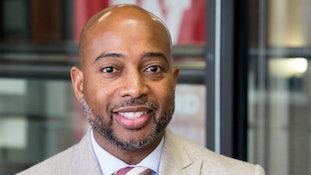AERA Fellows were announced on Thursday and a distinguished list of researchers topped the list including Dr. Jerlando F. L. Jackson.
Jackson, a professor and dean of the Michigan State University (MSU) College of Education, is among 24 exemplary scholars selected by the American Educational Research Association.
 Dr. Jerlando F. L. Jackson
Dr. Jerlando F. L. Jackson
The AERA Fellows Program honors scholars for their exceptional contributions to, and excellence in, education research. Nominated by their peers, the 2024 Fellows were selected by the Fellows Committee and approved by the AERA Council, the association’s elected governing body.
In addition to his role as dean, Jackson is the MSU Research Foundation Professor of Education and director and chief research scientist of the Organizational Disparities Laboratory. He has ushered the College of Education through the finalization of a strategic plan and strengthened relationships with the MSU College of Natural Science and MSU Health Sciences, resulting in new initiatives like the Advancing Education with Science strategic priority. It positions the college to lead in the areas of virtual education, intelligent classroom design and utility, artificial intelligence in education, STEM education and VAX-R, the mixed application of virtual reality, augmented reality, and extended reality to create industry changing teaching and learning experiences.
Jackson also created a series of initiatives to foster information sharing, collaboration, and support within the college community, including InformED, in which university leaders share expertise with the college, and ExplorED, a video series showcasing influential leaders discussing critical challenges related to education, health, and well-being.
Jackson's research has included work on interventions designed to broaden the participation of underrepresented groups in the scientific workforce. His research on hiring practices, career mobility, workforce diversity, and workplace discrimination evolved into his work on organizational disparities with a particular focus on STEM.




















